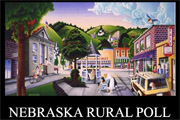Agricultural Economics, Department of

Nebraska Rural Poll
Date of this Version
2011
Document Type
Report
Citation
Center for Applied Rural Innovation, CARI Research Report (July 2011) 11-2, 19 pages
Institute of Agriculture and Natural Resources, University of Nebraska-Lincoln
Also available at https://ruralpoll.unl.edu/pdf/11animalwelfare.pdf
Abstract
Almost all rural Nebraskans recognize the importance of livestock and poultry production to the state’s economy and most rural Nebraskans are familiar with livestock care practices. In fact, many rural Nebraskans have experience raising beef cattle, poultry and swine. They have less experience with dairy production.
Most rural Nebraskans believe animal welfare means providing adequate exercise, space and social activities for the animals in addition to food, water and shelter. However, the vast majority of rural Nebraskans agree that animal welfare means at least providing adequate food, water and shelter to livestock animals.
Most rural Nebraskans trust livestock farmers and their veterinarians to care for their animals. And, most believe the welfare of animals is better protected on family farms than on large, corporate farms.
Most rural Nebraskans believe that current regulation of the state’s livestock practices is adequate to ensure the welfare of food animals. And, over one-third disagree that more regulation is needed to ensure the welfare of food animals. A sizeable proportion of rural Nebraskans (approximately one-third), though, have no opinion about the adequacy of current regulation or the need for additional regulation. Persons with agriculture occupations are more likely than persons with different occupations to agree that current regulation of Nebraska livestock practices is adequate to ensure the welfare of food animals and they are more likely than persons with different occupations to disagree that more regulation of livestock practices is needed to ensure the welfare of food animals.
Most rural Nebraskans believe regulation will impact the cost of livestock production and food. Persons working in agriculture are more likely than persons with different occupations to believe regulation will impact these costs.
Included in
Agribusiness Commons, Agricultural and Resource Economics Commons, Civic and Community Engagement Commons, Community-Based Research Commons, Demography, Population, and Ecology Commons, Entrepreneurial and Small Business Operations Commons, Place and Environment Commons, Public Affairs, Public Policy and Public Administration Commons, Regional Economics Commons, Rural Sociology Commons

